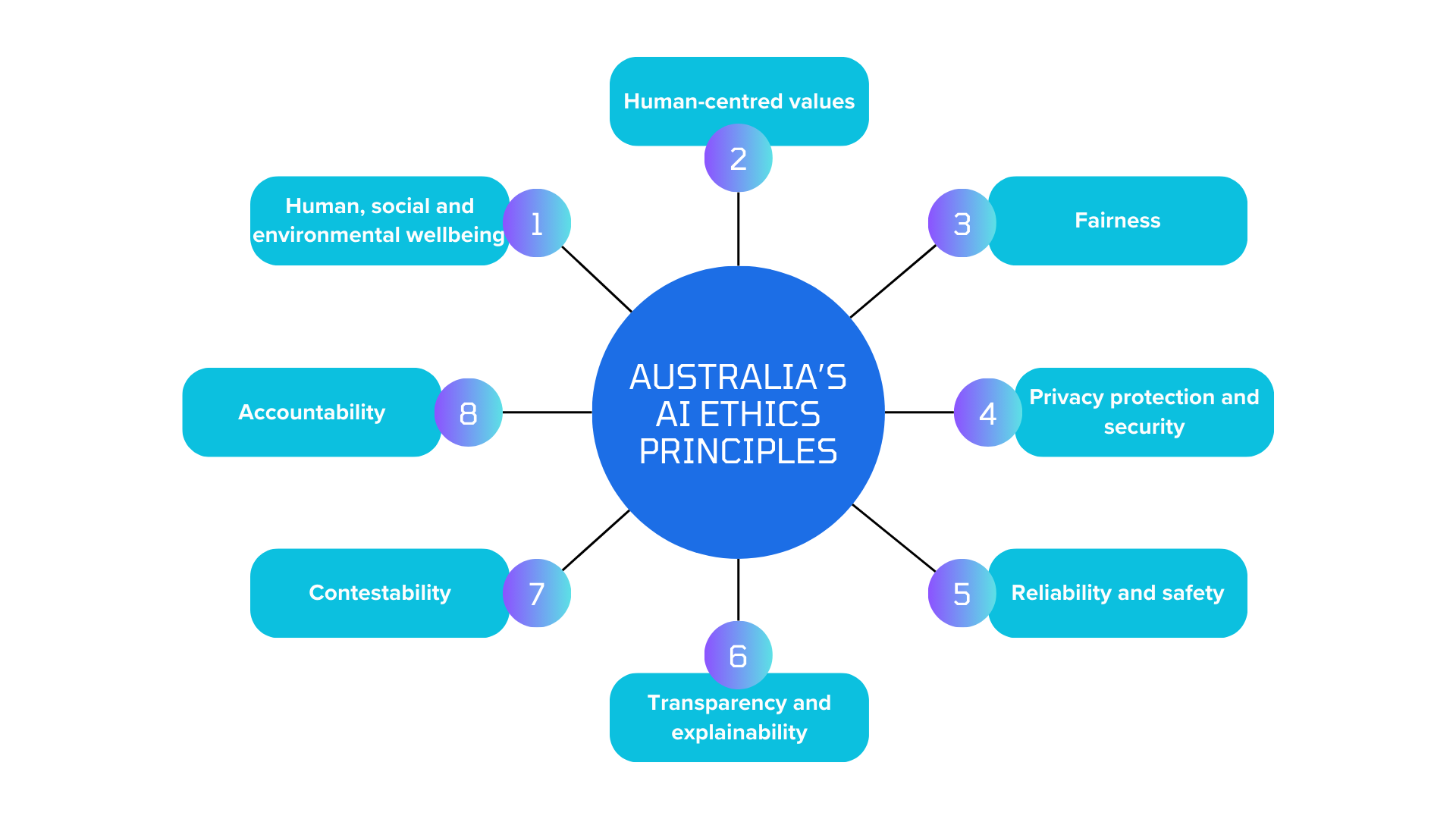

Explore the critical aspects of Australia’s AI Ethics Principles and their application in fostering responsible AI development, ensuring a balance between innovation and ethical considerations.
Australia’s 8 AI Ethics Principles provide a framework to ensure AI is developed in a safe, secure, and ethical manner. They aim to foster safer, fairer, and more reliable outcomes for Australians while mitigating risks associated with AI. The voluntary principles encourage businesses and governments to maintain high ethical standards in AI development. By adhering to these principles, organisations can build public trust, enhance customer loyalty, and drive positive outcomes. These guidelines are meant to complement existing regulations, promoting ethical AI use for the benefit of society.
Key principles include ensuring AI contributes positively to human, societal, and environmental well-being, upholding human rights, ensuring fairness, safeguarding privacy, promoting transparency, and maintaining accountability throughout the AI lifecycle. Contestability and reliability are also crucial, enabling challenges to AI decisions and ensuring systems work safely as intended. These principles help build public trust in AI and ensure it serves all Australians responsibly.

AI must benefit individuals and society, contributing positively to the environment. Systems should support human rights and well-being without causing harm. AI should enhance living standards and support ethical business practices. When considering environmental impacts, AI technologies must promote sustainability and minimise ecological damage.
These values include fairness, respect for human rights, and equality. AI systems should not undermine fundamental freedoms or human dignity. It’s vital to ensure the systems reflect the values of the society in which they are deployed, respecting individuals’ rights and cultural differences.
AI must operate in a non-discriminatory manner. The system’s design and operation should promote fairness and avoid biased outcomes, ensuring that people are not unfairly treated based on race, gender, or any other characteristic. This also applies to the decision-making process, ensuring equal treatment and accountability.
AI systems must protect the privacy of individuals by adhering to strong data protection standards. They should ensure that personal data is handled securely and ethically, with systems designed to safeguard sensitive information against misuse, breaches, or unauthorised access.
AI systems must function as intended and be safe throughout their lifecycle. The system’s reliability is paramount, ensuring consistent performance and proper handling of risks. Systems should have rigorous safety protocols to minimise any potential harm, and ongoing testing is critical to maintaining reliability over time.
Transparency is crucial in AI systems, meaning their processes and decision-making mechanisms should be explainable to users. Ensuring that individuals can understand how an AI system operates helps build trust. It also allows users to assess whether the system’s behaviour aligns with expected outcomes, enhancing accountability.
If an AI system produces an adverse outcome, affected individuals should have the opportunity to challenge the decision. Contestability ensures there are mechanisms in place for reviewing and rectifying any unintended consequences of AI operations, allowing for corrective measures when necessary.
Developers and operators of AI systems are accountable for the system’s outcomes. They must ensure that AI is developed, used, and maintained responsibly, with clear mechanisms for identifying and correcting issues. Accountability also involves transparency in the decision-making process and ensuring that AI is subject to oversight and governance.
Australia’s AI Ethics Principles play a pivotal role in guiding ethical AI development while fostering transparency, accountability, and societal benefits. For those interested in how these principles align with Australia’s National AI Framework and its influence on public policy, governance, and long-term AI strategies, you can explore a detailed examination in the AI Consulting Group’s article which delves into how the framework is shaping the future of AI regulation and development in Australia.
Get in touch with AI Consulting Group via email, on the phone, or in person.
Send us an email with the details of your enquiry including any attachments and we’ll contact you within 24 hours.

Call us if you have an immediate requirement and you’d like to chat to someone about your project needs or strategy.

We would be delighted to meet for a coffee, beer or a meal and discuss your requirements with you and your team.
